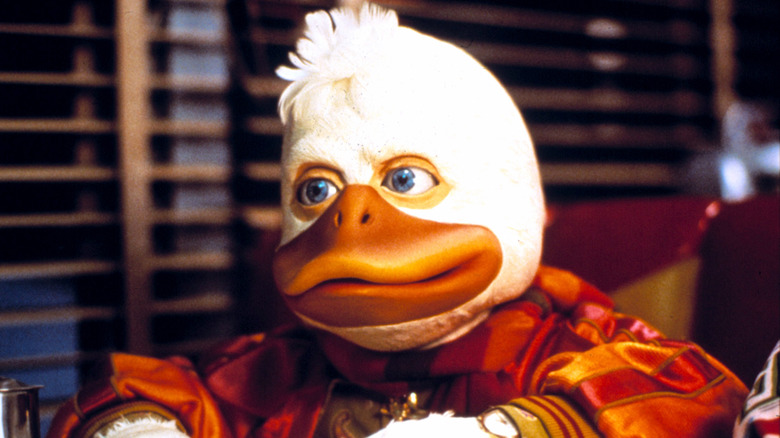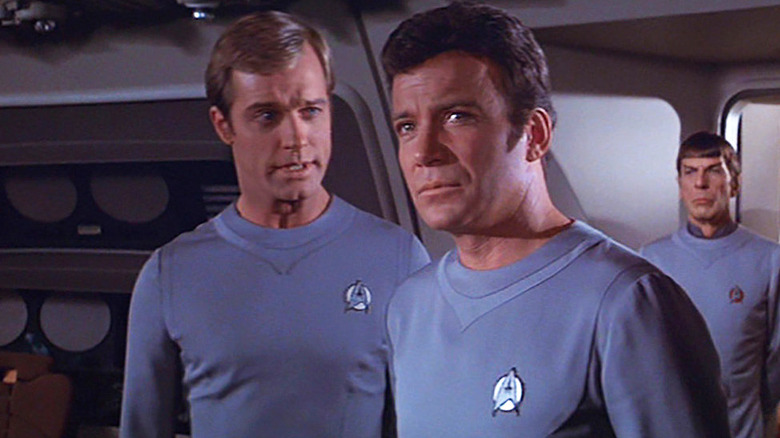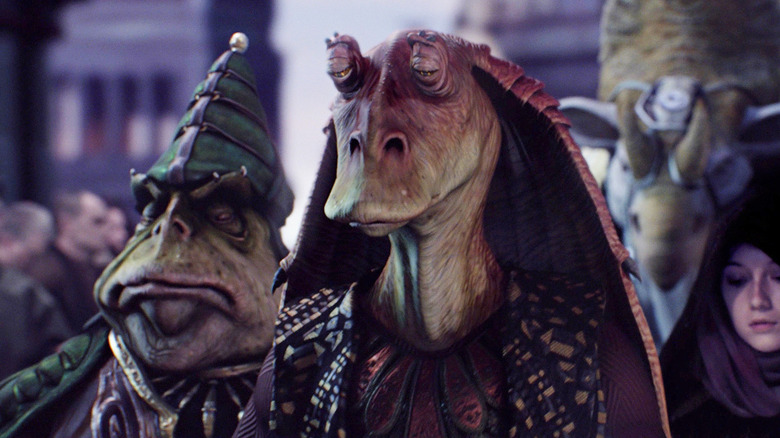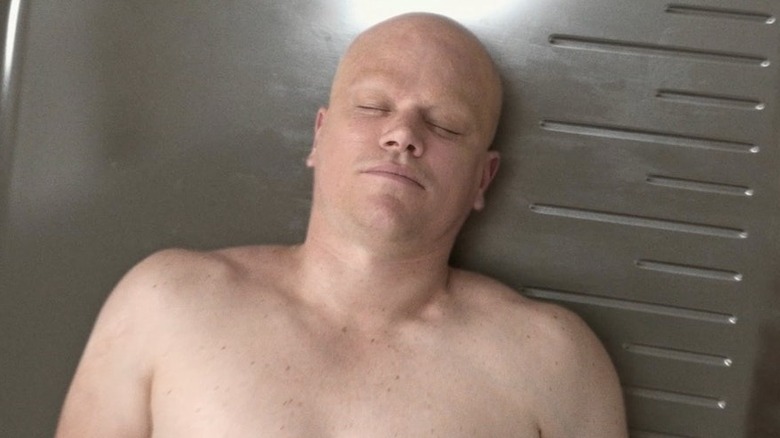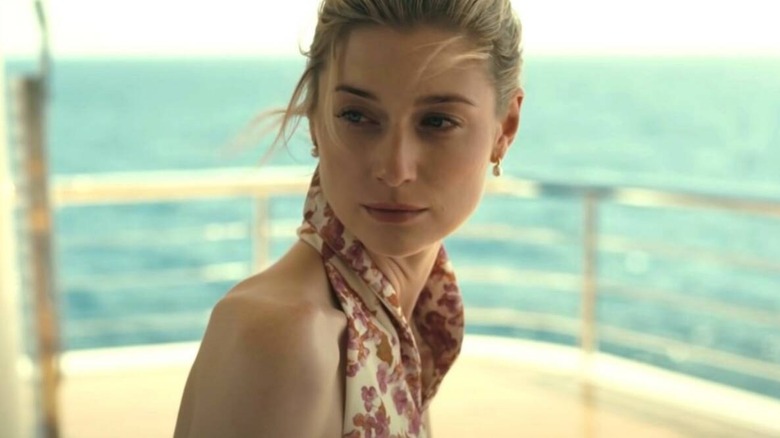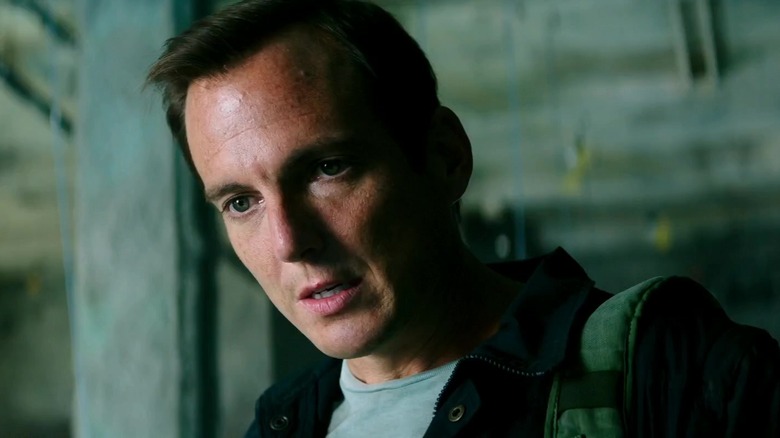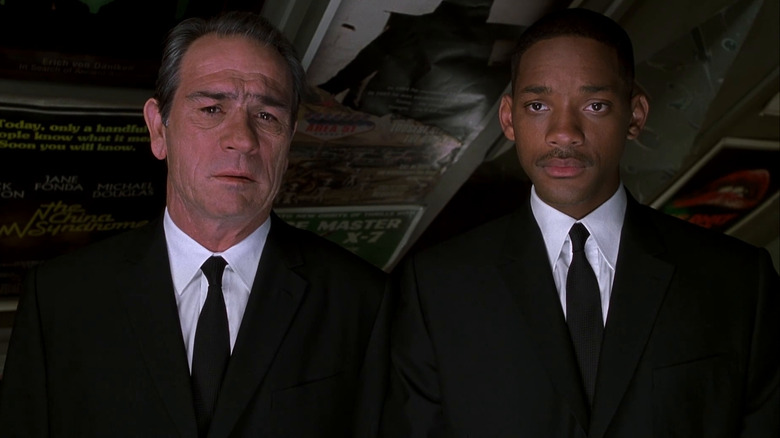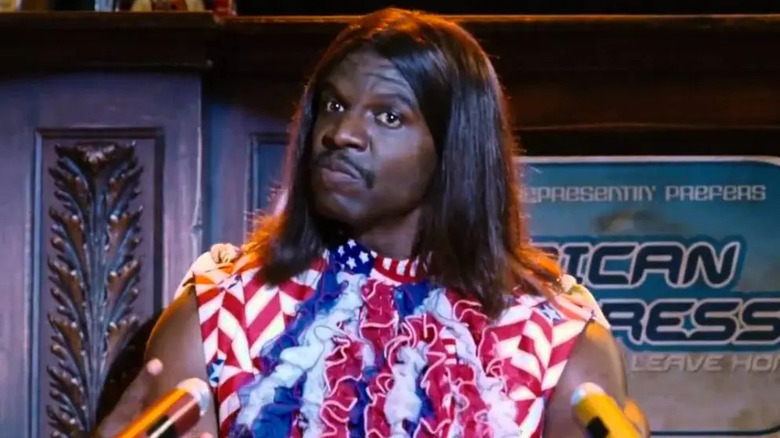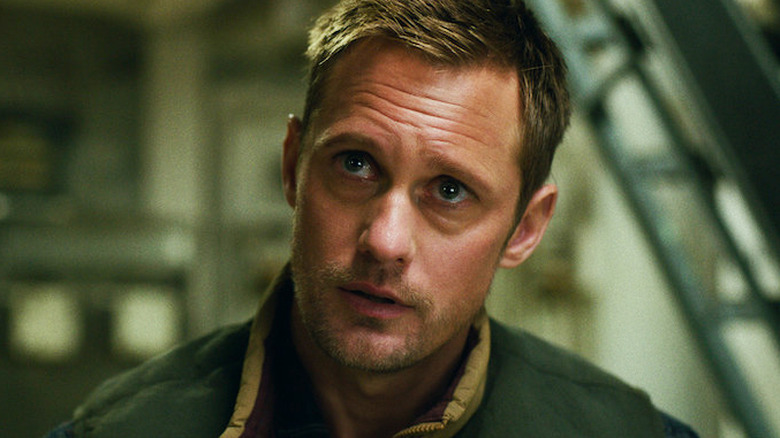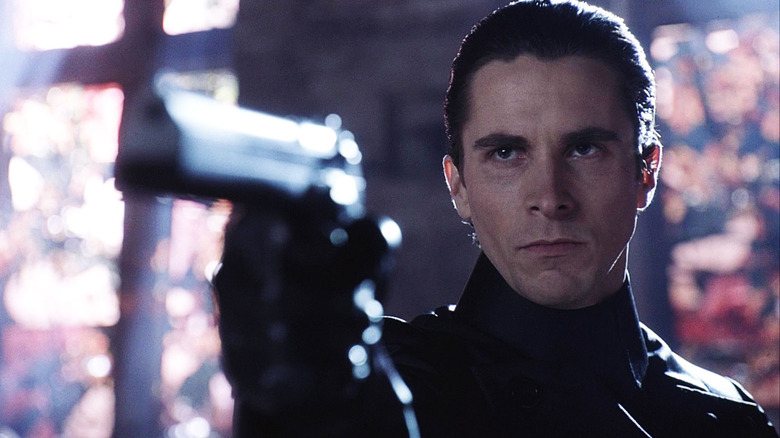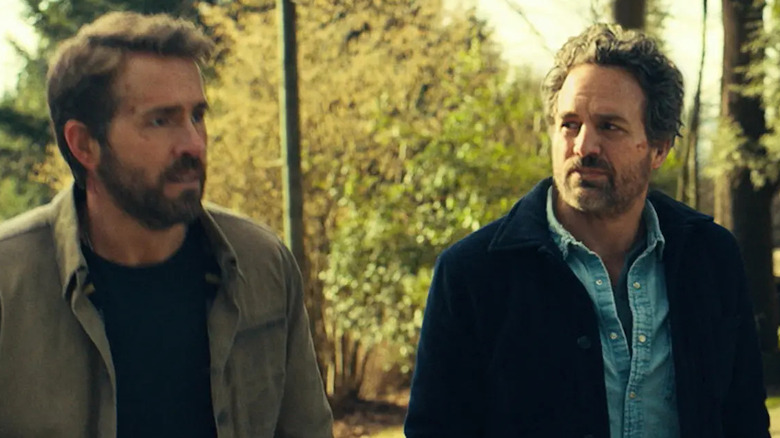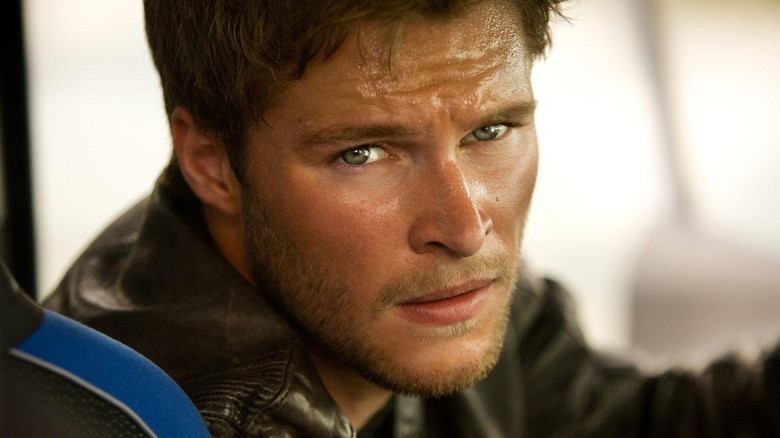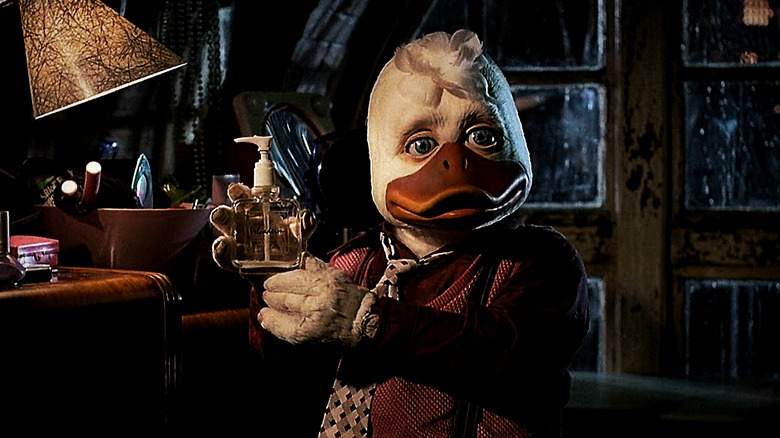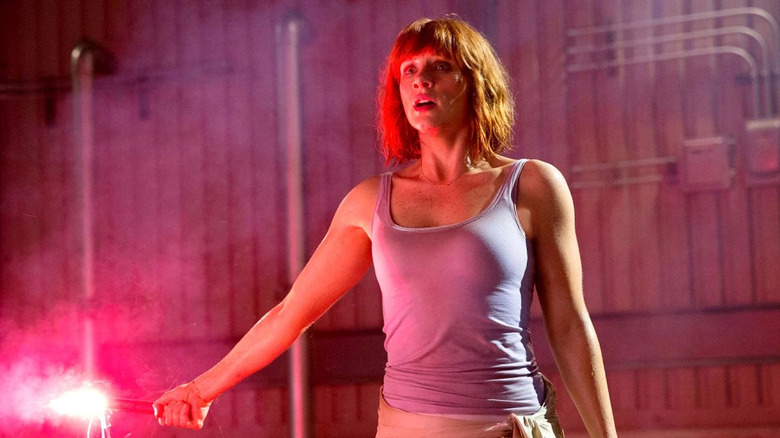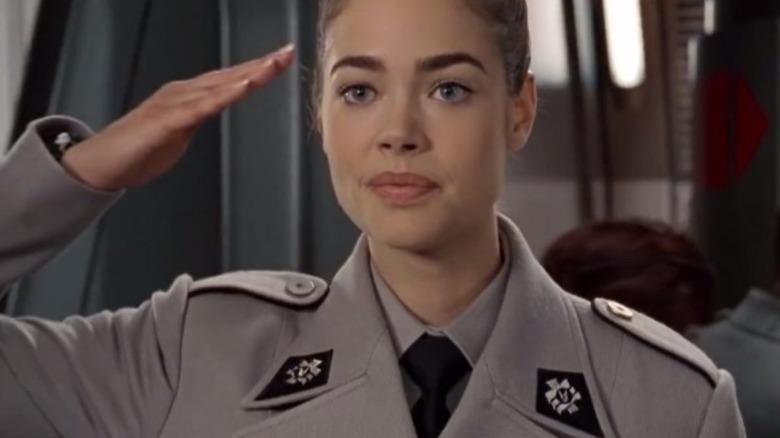Sci-Fi Movie Heroes That Would Make Way Better Villains
Science fiction is ultimately the story of good versus evil. Whether it's the conflict between the Jedi and Sith in the "Star Wars" franchise, the war against the machines in "The Terminator" franchise, or the cruelty of HAL-9000 in "2001: A Space Odyssey," sci-fi movies require great heroes and villains. Neo (Keanu Reeves) wouldn't be nearly as heroic in "The Matrix" if he didn't have to face off against Agent Smith (Hugo Weaving).
Unfortunately, not every sci-fi movie can fulfill those expectations. There's nothing worse than a bland protagonist that you can't connect with. Perhaps, a movie like 2003's "Daredevil" wouldn't be nearly as bad if Matthew Murdock had at least been a compelling character. A dull protagonist can sometimes even bring down an entire movie. Although 2009's "Avatar" is a modern classic, Jake Sully (Sam Worthington) is hardly a likable character. However, a shocking plot twist can do a lot to change a film. Here are 14 sci-fi movie heroes who would make way better villains.
Willard Decker, Star Trek: The Motion Picture (1979)
"Star Trek: The Motion Picture" was very different from the original series. Unlike the exciting show, "The Motion Picture" was a slow-paced, philosophical science fiction film, similar to "2001: A Space Odyssey." The movie deals with intriguing concepts but lacks a compelling villain. The film revolves around Captain James T. Kirk (William Shatner) and Spocks' (Leonard Nimoy) search to find a mysterious alien cloud known as V'ger. It is not until the end of the film that Kirk and his crew discover that V'ger is just a satellite probe from the 20th century.
However, Kirk has other things to deal with in "The Motion Picture." He's been promoted to the rank of Admiral and has to re-take command of the starship U.S.S. Enterprise. This sparks conflict with the ship's current captain, Willard Decker (Stephen Collins). Decker is angry that he has to relinquish control. During the search for V'ger, Decker becomes obsessed with the Deltan navigator Ilea (Persis Khambatta).
If Decker's anger with Kirk had resulted in him becoming a villain, it may have added more action to the film. "The Motion Picture" revolves around Kirk dealing with his age, and recognizing that the Federation is sometimes wrong. Having a younger captain rebel against him could make these themes more resonant.
Jar Jar Binks, Star Wars: Episode III - Revenge of the Sith (2005)
A popular "Star Wars" fan theory emerged that suggested that the obnoxious Gungan Jar Jar Binks (Ahmed Best) is secretly a Sith Lord. Although this idea seems absolutely ridiculous, there is compelling evidence to support the case. According to the theorists, Jar Jar purposefully acts like a clumsy fool in order to deceive his opponents. The idea of a powerful force user disguising themselves isn't a new one in the "Star Wars" universe. Yoda (Frank Oz) acts like a crazed goofball in "The Empire Strikes Back" before revealing his true identity to Luke Skywalker (Mark Hamill).
Jar Jar is mysteriously given an inordinate amount of power in the "Star Wars" prequel trilogy. He is responsible for granting Supreme Chancellor Palpatine (Ian McDiarmid) emergency powers during a critical vote. This allows Palpatine to create the Grand Army of the Republic, which he ultimately uses against the Jedi Order. Were Palpatine and Jar Jar secretly working together? It's not that far-fetched; they both come from the planet Naboo. Jar Jar is renowned as one of the most annoying characters in film history. Perhaps, he would be redeemed in the eyes of fans if he was actually a Sith Lord.
Paul Safrânek, Downsizing (2017)
Alexander Payne's sci-fi dramedy "Downsizing" has a great premise. In the future, human beings are being shrunken in order to prevent overpopulation and global warming. Those that choose to go through with the experimental procedure are able to live in an idealized miniature community. Unfortunately, the film wastes its interesting concept. What should have been a searing commentary on the failures of creating a utopia turns into a generic story about a middle-aged white guy who is trying to find himself.
Matt Damon can't be faulted for giving a bad performance, but Paul Safrânek is simply a flat character. His wife, Audrey (Kristen Wiig), chooses not to be "downsized," and divorces him. Paul's mid-life crisis feels melodramatic and generic. The audience has no reason to root for him as he tries to create a perfect society.
However, the film could have gone a more interesting route if Paul had become bitter and malicious. Instead of trying to save the smaller world, he could have tried to wreak havoc. Damon rarely gets the chance to play the bad guy. Nevertheless, his villainous roles in "The Talented Mr. Ripley" and "The Departed" are among his best.
Kat, Tenet (2020)
Christopher Nolan deserves a lot of praise for his brilliant concepts and mind-blowing action sequences. However, Nolan has never been able to write compelling female characters. The women in Nolan's films are generally bland, despite the talented actresses that he gets to play them. Kat (Elizabeth Debicki) is one of the least interesting characters in Nolan's mind-bending sci-fi action epic "Tenet." The romantic subplot between Kat and the Protagonist (John David Washington) is never very believable, and their flirtations feel especially stilted.
Kat is the wife of the Russian oligarch Andrei Sator (Sir Kenneth Branagh). Sator communicates with the future in order to conceive of his evil plan. Kat is only interested in protecting her son and betrays Sator in order to keep her child safe. However, Kat is still a wealthy woman who deals in antique artwork. If she had ended up betraying the Protagonist and Neil (Robert Pattinson), it could have given the film more emotional stakes. "Tenet" is a spy film. It would have been cool to see Nolan acknowledge noir classics by having Kat transform into a femme fatale. It's certainly a role that Debicki could handle, but she isn't given the chance to shine in "Tenet."
Vern Fenwick, Teenage Mutant Ninja Turtles: Out of the Shadows (2016)
The 2014 film "Teenage Mutant Ninja Turtles" was a massive disappointment for longtime fans of the comics and the original cartoon. Not only did the CGI versions of the turtles look creepy, but the film had the same crass, obnoxious humor as Michael Bay's "Transformers" films. There is not enough time dedicated to showing the four turtles becoming heroes. Instead, the film inserts cringe-inducing comedy scenes featuring April O'Neil (Megan Fox) and her goofy cameraman, Vern Fenwick (Will Arnett).
Instead of learning from the first film's mistakes, the 2016 sequel "Teenage Mutant Ninja Turtles: Out of the Shadows" doubles down on everything that had made it so underwhelming. Vern is actually given more to do, though. He takes credit for saving the city and constantly tries to flirt with April. What if he had gone one step farther? What if he tried to betray April and team up with Krang (Brad Garrett) to destroy Earth? Arnett is an extremely talented actor, and he's absolutely wasted in the "Teenage Mutant Ninja Turtles" films. Letting him give an over-the-top villain performance certainly would have been fun.
Agent K, Men in Black II (2002)
The 2002 sequel "Men in Black II" failed to capture the magic of the original. In the first film, the relationship between Agent J (Will Smith) and Agent K (Tommy Lee Jones) felt fresh and exciting. J learns about the aliens that are living on Earth as he trains with K. In the sequel, this fun dynamic falls completely flat. K's memory was wiped at the end of the first film, and J has to restore his mind. This subplot just wastes time.
Tommy Lee Jones looks like he doesn't even want to be on set. K's grizzled cynicism was humorous in the first film, but in the sequel, it is just obnoxious. K has a good reason to be upset with J. K had his memory erased so that he could live a normal life, and now J has destroyed that. Perhaps, K's anger with J could have sparked a conflict between the two. Considering that the film's actual villain, Serleena (Lara Flynn Boyle), isn't very compelling, creating a rift in the original partnership would have been a twist on the buddy cop formula.
President Camacho, Idiocracy (2006)
It's a little bit scary how predictive the 2006 satire "Idiocracy" ended up being. The film follows the "most average" human being on the planet, U.S. Army librarian Corporal Joe Bauers (Luke Wilson). Joe is selected for an experimental program, where he is kept alive for 500 years in suspended animation. Joe wakes up in 2505 when the average IQ of the population has severely declined. As a result, Joe is now the smartest human being on the planet.
A film about the worldwide population ignoring science may have been funny in 2006, but in 2022, it feels a bit unnerving. The one thing that "Idiocracy" didn't predict was a totalitarian dictator in the White House who refuses to give up power. President Dwayne Elizondo Mountain Dew Herbert Camacho (Terry Crews) is hardly a nice guy, but he ends up listening to Joe in the end. He isn't upset when Joe is elected as the new President.
It's perhaps the only optimistic aspect of the film, but things could have been very different had Camacho not been so understanding. "Idiocracy" director Mike Judge actually planned to weaponize the Camacho character for an "anti-Trump" PSA, but his ideas were turned down by 20th Century Fox. If only Judge had been able to see through with his vision.
Dr. Nathan Lind, Godzilla vs. Kong (2021)
2021's "Godzilla vs. Kong" is the best film in the "Monsterverse" so far. Why? It spends the least amount of time focused on the human characters. 2014's "Godzilla," "Kong: Skull Island," and "Godzilla: King of the Monsters" all assembled amazing casts, but suffered from bland writing. Audiences showed up to see the monsters; they didn't want to waste time with these pesky humans! Although "Godzilla vs. Kong" spends the most time dedicated to the massive creatures themselves, it has the worst protagonist of the entire franchise.
Dr. Nathan Lind (Alexander Skarsgård) is recovering from the death of his brother. Nathan reluctantly agrees to help lead an expedition into the Hollow Earth. He's mostly there to recite expositional lines to the audience. At least actors like Brian Tyree Henry, Millie Bobbie Brown, and Rebecca Hall seem like they are having fun saying the ridiculous lines.
The actual villain subplot in "Godzilla vs. Kong" seemingly comes out of nowhere. The wealthy CEO Walter Simmons (Demián Bichir) activates Mechagodzilla, forcing Godzilla and Kong to team up. Having Nathan take control of Mechagodzilla may have been more rewarding. We know that Skarsgård can be a great villain already, thanks to "Big Little Lies."
John Preston, Equilibrium (2002)
2002's "Equilibrium" takes place in a dystopian future, where a totalitarian government has taken over in the aftermath of World War III. Humans are strictly prohibited from expressing emotion. "Sense Offenders" that violate the guidelines are purged from society by government officers called "Clerics." John Preston (Christian Bale) is one of the most ruthless Clerics. Early in the film, he executes his partner, Errol Partridge (Sean Bean), for disobeying the rules.
However, Preston ultimately realizes the error of his ways. He rebels against the system and fights for the future of mankind. This isn't very realistic given what we already know about him. Preston has shown his unflinching commitment to the government; he allowed his wife to be executed for being a "Sense Offender." It's also difficult for the audience to relate to Preston, as they have already witnessed his execution of Partridge. "Equilibrium" would have been more powerful if Preston had accepted everything that he has been taught to believe. This would have effectively shown the damaging effects of fascism and propaganda.
Louis Reed, The Adam Project (2022)
"The Adam Project" suffers because of its lack of self-awareness. Shawn Levy and Ryan Reynolds collaborated on the enjoyable satire "Free Guy," but none of what made that movie work translated to "The Adam Project." The film follows pilot Adam Reed (Ryan Reynolds), who goes back in time to find his younger self (Walker Scobell). Adam should be a likable character, but he's very dismissive of his mother, Ellie (Jennifer Garner). Instead of appreciating his mother for all of her hard work, Adam dreams about his father, Louis (Mark Ruffalo), who has passed away.
Louis was a scientist that was experimenting with time travel, and the two Adams go back in time to find their father. The entire family has to work together to defeat the evil business tycoon Maya Sorian (Catherine Keener), who has monopolized time travel in order to become the most powerful person in the world. Keener's over-the-top performance sticks out like a sore thumb. It would have been much more emotionally resonant if Louis ended up being the villain. Adam would learn that instead of idealizing his father, he should have taken the time to appreciate his mother. We all need to appreciate Jennifer Garner!
Shane Dyson, Transformers: Age of Extinction (2014)
2014's "Transformers: Age of Extinction" brought the science fiction franchise to a new low, if that was even possible. The human characters in Michael Bay's "Transformers" franchise have never been very compelling, but the protagonists of "Age of Extinction" are downright detestable. The film actually contains a scene in which the greasy racer Shane Dyson (Jack Reynor) justifies his relationship with an underage girl, Tessa Yeager (Nicola Peltz). He cites the "Romeo and Juliet law." "Transformers" fans were used to disappointment, but this was downright offensive.
The film doubles down on its justification of Shane's actions by allowing Tessa's father, Cade, (Mark Wahlberg) to forgive him. Shane, Tessa, and Cade all work together to help the Autobots. The issue with the film is that Cade never truly proves himself to be a great father. He claims that he loves his daughter, but never shows any evidence to support that.
Shane is already established as being malicious in his intentions, and having human characters team up with the Decepticons isn't that far-fetched for the franchise. Earlier in the film, the CIA operative Harold Attinger (Kelsey Grammer) releases Galvatron in an attempt to kill Optimus Prime. Instead of a bland government tycoon, wouldn't it have been more interesting if Shane had allied himself with Megatron?
Howard the Duck, Howard the Duck (1986)
1986's "Howard the Duck" is truly one of the most baffling movies ever made. Regardless of how you feel about the Marvel Cinematic Universe, it's hard to argue that Marvel comic book adaptations could get any worse. The film is a tonal nightmare; it's too mature for younger viewers due to the sexual innuendos, but it's too wacky for adults because of the ridiculous characters. On top of that, the titular duck himself is downright unlikeable. Howard is rude and cynical, but not very clever.
The original "Howard the Duck" comic books by Steve Gerber were satirical of Marvel properties. Although we now have a self-aware Marvel hero in the form of Ryan Reynolds' "Deadpool," it would be interesting to see Howard the Duck revamped as a villain in the MCU. Seth Green joined the series as Howard for a brief cameo in the post-credit scene of 2014's "Guardians of the Galaxy." Green later reprised his role in the Disney+ series "What If... ?" We already know that Howard is friendly with shady characters like Taneleer Tivan (Benicio del Toro). Perhaps he could become a new thorn in the Guardians' side?
Claire Dearing, Jurassic World (2015)
"Jurassic World" pales in comparison to the original 1993 classic. There is a fundamental issue with the way that the film depicts its characters. In "Jurassic Park," Dr. Alan Grant (Sam Neill), Dr. Ian Malcolm (Jeff Goldblum), and Dr. Ellie Sattler (Laura Dern) make responsible decisions to keep everyone in the park safe. Their primary concern is avoiding the loss of life. In "Jurassic World," the new park director, Claire Dearing (Bryce Dallas Howard), acts irresponsibly in order to avoid causing a public relations fiasco.
In a logical sequel, Claire would be sent to prison for her crimes. However, "Jurassic World: Fallen Kingdom" and "Jurassic World Dominion" double down on making her the hero. There's nothing worse than a protagonist that does not learn from their mistakes or face the consequences of their actions. This is why turning Claire into the antagonist of the "Jurassic World" trilogy would have been more engaging. The "Jurassic Park" franchise does not have any recurring human villains, so giving Howard a continuous antagonist role could have helped the new trilogy distinguish itself from its predecessors.
Carmen Ibanez, Starship Troopers (1997)
"Starship Troopers" was vastly misunderstood upon its initial release. Those that found the film's characters to be one-note were missing the point that director Paul Verhoeven was making. "Starship Troopers" is a satire of propaganda films and the dehumanizing effects of fascism. The seemingly heroic protagonists lose their humanity as they are sucked into a military-industrial system that only contributes to the cycle of violence.
What's incredible about "Starship Troopers" is that beyond the satire, there is a tragedy to the story of Johnny Rico (Casper Van Dien). Johnny spends the entire film dreaming about his reunion with his high school sweetheart, Carmen Ibanez (Denise Richards). He's ignorant of the fact that he is falling in love with his fellow soldier, Dizzy Flores (Dina Meyer) until it's too late. Dizzy is killed during a battle with the alien bugs and dies in Johnny's arms.
When Johnny, Carmen, and their friend Carl Jenkins (Neil Patrick Harris) reunite during the film's conclusion, they've all blindly accepted the military jingoism that they've been fed. If Verhoeven had gone a more optimistic route, or allowed Carmen to lean into a more interesting, antagonistic storyline based on that blind loyalty, Johnny could have recognized that his former girlfriend is no longer worth saving.
